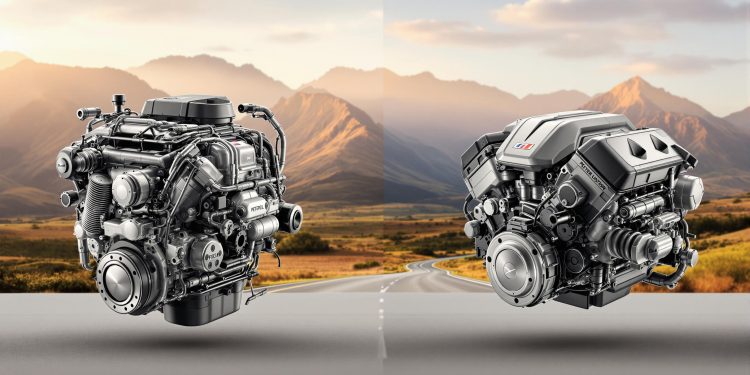Looking for the right engine type for your vehicle? Here’s the quick answer: Diesel is better for long-distance driving, towing, and heavy loads, while petrol suits city driving, short trips, and lower upfront costs. Your choice depends on your driving habits, budget, and vehicle type.
Key Takeaways:
- Fuel Costs: Diesel costs less per liter and is more fuel-efficient for long distances, but petrol is better for city traffic.
- Maintenance: Diesel engines last longer but are more expensive to service; petrol engines are cheaper to maintain but need more frequent servicing.
- Performance: Diesel offers higher torque for towing and off-road use; petrol provides quicker acceleration and agility in urban settings.
- Upfront Cost: Diesel vehicles are more expensive to buy but hold better resale value.
- Emissions: Diesel emits less CO₂ but more NOₓ and particulate matter compared to petrol.
Quick Comparison:
| Factor | Diesel | Petrol |
|---|---|---|
| Fuel Efficiency | Better for highways and long distances | Better for city driving |
| Upfront Cost | Higher purchase price | Lower purchase price |
| Maintenance | Higher service costs, longer engine life | Lower service costs, shorter engine life |
| Performance | High torque for towing/heavy loads | Quick throttle response for urban driving |
| Emissions | Lower CO₂, higher NOₓ and PM | Higher CO₂, lower NOₓ and PM |
Bottom Line: Choose diesel if you drive long distances or need a work vehicle. Opt for petrol if you mostly drive in the city or want a lower upfront cost.
Ford Figo Review: Petrol vs Diesel

Fuel Costs and Usage
When evaluating running costs, it’s important to look at current fuel prices and how consumption varies based on driving conditions.
Current Fuel Prices
As of May 2023, inland prices were as follows: 95 ULP at R23.34/l, diesel 0.05% at R20.15/l, and diesel 0.005% at R20.49/l. Coastal prices were slightly lower: 95 ULP at R22.62/l, diesel 0.05% at R19.43/l, and diesel 0.005% at R19.78/l.
Fuel Economy vs. Tank Cost
Filling an 80-liter tank inland in May 2023 would cost about R1,612 for diesel (common for vehicles like the Ranger or Hilux) compared to R1,867 for petrol.
City vs. Highway Costs
Diesel engines are more fuel-efficient on highways, especially during steady, long-distance driving. On the other hand, petrol engines tend to perform better in stop-and-go city traffic. Coastal regions further enhance diesel’s cost advantage. These factors can help you decide whether diesel’s highway savings or petrol’s city performance fits your driving patterns best.
Upkeep and Value
Beyond fuel costs, it’s important to consider maintenance and resale value to get a full picture of ownership expenses.
Service Costs
Diesel engines generally have higher service costs due to components like the Diesel Particulate Filter (DPF) and the need for AdBlue. On the other hand, petrol engines typically require less expensive parts but may need servicing more often. AdBlue, in particular, adds to the routine costs of maintaining a diesel engine.
Engine Life
Diesel engines are designed to handle higher compression levels, which often makes them last longer than petrol engines – provided they’re well-maintained. Key practices include using the correct oil grade, changing fuel filters on time, allowing the engine to fully warm up, and taking occasional longer drives to aid emissions system regeneration.
Resale Markets
Resale value depends on several factors: vehicle type, mileage, maintenance history, local fuel prices, emissions regulations, and demand for specific models. In regions like South Africa, diesel vehicles – especially light commercial models and larger SUVs – often hold their value better than petrol variants.
When you combine these factors with running costs, you get a clearer view of the overall cost of ownership.
sbb-itb-09752ea
Power and Handling
Let’s break down how diesel and petrol engines stack up in terms of performance and handling.
Pulling Power
Diesel engines excel when it comes to torque, often delivering up to 50% more than their petrol counterparts. For instance, the Land Rover Discovery S Td6 produces 600 Nm of torque, compared to 450 Nm in the Si6 petrol version. Similarly, in the Toyota Hilux lineup, the 2.4 GD6 diesel engine generates 400 Nm, while the 2.7-liter petrol variant offers just 245 Nm. This extra torque makes diesel engines a solid choice for towing trailers, hauling heavy loads, tackling off-road terrain, or long highway drives.
City Performance
Petrol engines, on the other hand, shine in urban settings. They offer quicker throttle response and higher rev ranges, making them more agile for city driving. Take the Audi Q5 2.0 TFSI quattro as an example – it accelerates from 0 to 100 km/h in just 6.3 seconds. Meanwhile, the 2.0 TDI diesel version takes 7.9 seconds to achieve the same speed. Petrol engines are better suited for stop-and-go traffic, short commutes, and quick overtakes.
Best Uses
Here’s how these traits align with specific needs:
- Family SUV: Opt for diesel for long trips and occasional towing (e.g., Hyundai Tucson 2.0 CRDi Elite: 131 kW/400 Nm).
- City Car: Go with petrol for daily commutes (e.g., Ford Fiesta 1.0 Trend: 74 kW/170 Nm).
- Luxury Sedan: Ideal for mixed use (e.g., Mercedes-Benz C220d: 143 kW/400 Nm).
- Work Vehicle: Diesel is the better choice for handling heavy loads (e.g., Toyota Hilux 2.4 GD6: 110 kW/400 Nm).
Up next, we’ll explore emissions and air quality to help finalize your decision.
Emissions and Air Quality
When choosing a vehicle in South Africa, emissions and air quality considerations are just as important as towing power and running costs. Let’s break down the key differences in pollutants between diesel and petrol engines.
Types of Emissions
Here’s how diesel and petrol engines stack up when it comes to emissions:
- Carbon dioxide (CO₂): Diesel engines emit 15-20% less CO₂ per kilometer compared to petrol engines.
- Nitrogen oxides (NOₓ): Diesel engines produce 4-5 times more NOₓ emissions than petrol engines.
- Particulate Matter (PM): Diesel engines release significantly more fine particles unless equipped with a diesel particulate filter (DPF).
South African Regulations
South Africa’s National Environmental Management: Air Quality Act (NEMA AQA) enforces Euro 4 standards for all new vehicles. These standards include:
- CO₂ emissions: Must be below 120 g/km.
- NOₓ limits: 0.08 g/km for petrol engines, 0.25 g/km for diesel engines.
- PM limits: 0.025 g/km for diesel engines only.
These rules not only impact vehicle choices but also influence resale values and maintenance costs.
Advances in Engine Technology
Modern engines are equipped with systems that significantly reduce emissions for both fuel types:
- Diesel engines: Use Selective Catalytic Reduction (SCR) technology, which lowers NOₓ emissions by up to 90% with the help of AdBlue.
- Petrol engines: Feature three-way catalytic converters that cut carbon monoxide (CO), hydrocarbons (HC), and NOₓ emissions by up to 98%.
- Mild-hybrid systems:
- 48V systems can improve fuel efficiency by 10-15%.
- Start-stop technology reduces emissions during idling.
- Regenerative braking captures energy to improve overall efficiency.
It’s worth noting that emissions control systems can affect long-term maintenance costs. For instance, replacing a diesel particulate filter (DPF) typically costs around R15,000 every 100,000 km.
Making Your Choice
Use the cost, performance, and emissions data provided to assess which option fits your driving habits.
Key Factors to Consider
Daily Driving Distance
For drivers who cover long distances, diesel is a better fit. Over 100,000 km, diesel’s lower fuel consumption can save between R56,000 and R86,000 compared to petrol.
Initial Cost
Diesel vehicles typically come with a higher price tag than their petrol counterparts:
- Ford Fiesta Diesel: Costs R30,600 more than the petrol version
- Hyundai Tucson Diesel: Carries a R65,000 premium
- Toyota Hilux Diesel: Priced R35,600 higher than the petrol model
Fuel Efficiency
For larger vehicles like SUVs and bakkies, diesel engines tend to be more fuel-efficient, averaging around 7–8 L/100 km, compared to petrol engines that consume roughly 9–12 L/100 km.
Quick Guide: Which Engine Type Fits Your Needs?
| Factor | Go with Diesel if… | Choose Petrol if… |
|---|---|---|
| Driving Habits | You drive long distances (>30,000 km/year) | You mostly take short city trips |
| Vehicle Type | You need an SUV or bakkie | You prefer a compact car |
| Budget | You can afford a higher upfront cost | You want a lower purchase price |
| Driving Style | You tow or haul heavy loads often | You focus on city driving |
Conclusion
Take a close look at your driving habits and the factors outlined above to determine the best engine type for your needs. In South Africa, the decision between diesel and petrol vehicles largely depends on how you drive and your budget. Diesel tends to be more economical for high-mileage drivers, especially for larger SUVs and bakkies, while petrol is a better fit for low-mileage, city-based drivers.
For SUVs and bakkies, diesel engines offer extra torque, making them ideal for heavy-duty tasks and long trips. On the other hand, petrol engines are often more practical for urban driving and shorter distances, thanks to their lower upfront costs and easier maintenance.
Consider factors like your annual mileage, vehicle type, typical driving conditions, purchase price, and service-plan duration. By evaluating these elements, you’ll be able to make a well-informed decision that aligns with your specific requirements.
Related posts
- Fuel-Saving Tips for Long South African Road Trips
- Top 5 Cars for South African Roads
- Best Fuel-Efficient Cars for Commuting in South Africa
- Electric vs Hybrid: Fuel Costs Compared





